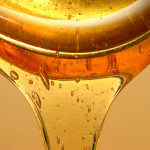Sweeten Your Life with Agave Nectar

So, what did we clever humans do to avoid these unwanted health side effects while continuing to satisfy our desire for sweets? We manufactured artificial sweeteners such as Sweet-n-Low®, Equal®, and Splenda®. The problem with these laboratory-produced powders is that they register as far sweeter on our taste buds than table sugar does—up to 600 times sweeter! This has prompted many researchers to theorize that even though these substances have little effect on our blood sugar or waistlines, their hyper-sweetness actually causes an increase in our cravings for sweet treats—which is what continues to feed our type-2 diabetes and obesity epidemics.
As science began to reveal the darker side of these sugar substitutes, the food industry turned to nature. One of the most promising natural sweeteners to come on the market is agave nectar (pronounced ah-GAH-vay). This nectar, or syrup, is produced from the sap harvested from the core of the Blue Agave plant, which is native to Mexico.
Light (colored) agave nectar is similar in shade to honey, though thinner in consistency. Because agave nectar contains primarily fructose*, it doesn’t create the rise in blood sugar as sugar and honey do, giving it the nod of approval from the American Diabetes Association. (Though I must caution you, it does contain calories.) The other beauty of agave is it has virtually no perceivable taste beyond that of “sweet”. I have even been able to use in my tea (both hot and iced) without noticing a flavor change—and that makes me very happy!
*Articles/studies have surfaced reporting agave to be unhealthy, linking it to fatty liver disease. While it’s true agave must be processed in the liver (and for this reason, doesn’t elevate blood sugar levels much), these studies warn of the link between HIGH consumption of fructose (the sugar found in fruit) and liver damage. So, my take on this is: If we haven’t been warned against eating too much fruit (Weight Watchers encourages HIGH fruit consumption), then ½ tsp in your tea/coffee rather than I tsp of sugar spiking sugar will be better for you in the short and long run!